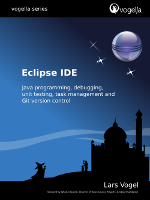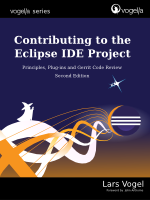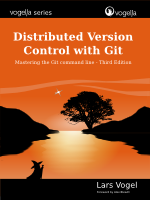This book gives a detailed introduction into the Eclipse platform and covers all relevant aspects of Eclipse RCP development.
Every topic in this book has a content section in which the topic is explained and afterwards you have several exercises to practice your learning.
You will be guided through all relevant aspects of Eclipse 4 development using an comprehensive example which you continue to extend in the exercises.
You will learn about the new programming concepts of Eclipse 4, e.g. the application model, dependency injection, CSS styling, the renderer framework, the event system and much more.
Proven Eclipse technologies like SWT, JFace viewers, OSGi modularity and services, data binding, etc. are also covered in detail.
This book gives an introduction into using the Eclipse IDE for Java development.
Instead of presenting all possible options, this book focuses on the important parts of the Eclipse IDE, e.g. how to navigate efficiently, which settings helps you to get more productive and the like.
It also contains lots of tips which allow advanced Eclipse users to work more productively with the Eclipse IDE.
You learn how to create Java programs with Eclipse and how to run them within and outside of Eclipse.
Debugging and unit testing are an important part in the daily work of a developer therefore these topics are also covered in detail.
The book also explains the usage of the Git version control system within Eclipse as Git is becoming more and more the dominate version control system.
This book describes how to contribute to the Eclipse open source project using the Eclipse platform project as example.
It starts with an introduction into the structure of the Eclipse project and how to contribute code via the Gerrit code review system.
It includes a short introduction into Eclipse plug-in development and a short introduction into JUnit tests and how to run the platform unit tests.
Afterwards tools to analysis the Eclipse code base are presented and it is explained how to build the Eclipse IDE itself.
The last chapters contains short information and interviews with Eclipse project leaders about how to contribute to selected popular Eclipse projects like SWT, JDT, CDT and Tycho.
This books starts with an introduction into distributed version control systems.
It continues to describe the basic Git terminology and how you can configure your Git tools.
As the book advances you learn how to connect to remote repositories and how to use branches and tags.
The book covers merging and rebasing changes and provides all the necessary tips and tricks to use Git.
It also covers the usage of the popular online Git hosting platforms GitHub or Bitbucket and describes typical Git workflows which are considered as good practice.





